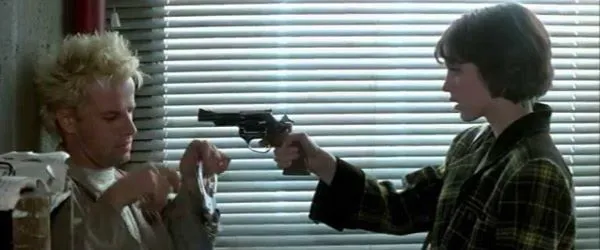Eye For Film >> Movies >> Subway (1985) Film Review

Released a year after Greystoke but shortly before Highlander was to give Christopher Lambert cult star status around the world, Subway is probably his best film. It's also the film that launched the career of director Luc Besson. Though he has never shown a great deal of skill in crafting a story, his extraordinary visual talent burst onto screens fully formed. Subway is all about style over substance, in itself and in its themes, and it's replete with images that will burn themselves into your brain.
1985 was a moment in French fashion when punk and post-punk styles were butting up aggressively against the mainstream. Despite its reputation for cutting-edge chic, Paris has always been quite conservative about how people dress in the street, and this, in combination with a growing financial divide, saw those who didn't fit driven out into the more notorious banlieues or literally driven underground. Although there had been people living in the city's disused Métro tunnels at least since the war, what had merely been a refuge was, in the Eighties, become a political option with its own subculture. In setting his film there, Besson was announcing himself as an outsider, as someone who, despite his artsy approach, was willing to break the rules. Aspects of the film - especially its ending - have been compared to Breathless, but where Godard seduced middle class viewers with his handsome imagery, Besson set out to make them uncomfortable.

Despite the presence of the English Channel, Thatcherism was also a potent influence in France at this time, with la dame du fer inspiring increasingly mercenary attitudes to money. Money, information and power are at the heart of this story, but it's in the ability to be willfully vulnerable that Besson situates the emotional weight of his creation. From the start, we are with the outlaw, Lambert's Fred, as he flees the scene of a robbery. A dramatic pursuit ends with him running into the tunnels, effectively exiled. Up above ground, the gangster he has robbed wields power against him, sending in his henchmen and pressuring the police. But both men have a weakness - Isabelle Adjani as the supercilious and bored potiche who sees Fred as a means of rebellion but, perhaps, can come to feel something real herself.
Hinging on an intensely romantic punk aesthetic and Lambert's utterly committed performance, the film is otherwise populated with flimsy characters who seem faded and remote the way other people do when one is obsessively in love. Each has a single distinctive trait, rather like Gideon Defoe's Pirates, but there are some very capable performers making what they can of this, including a young Jean Reno. He's one of Fred's bandmates, as the tale of this underground community shifts gears, forsaking the conventionally criminal, Fred walking into a trap as boldy as the young Luke Skywalker he playfully imitates. His goal is not to save his friends or the universe, but to sacrifice everything for rock n' roll.
If this sounds absurd, don't worry - that's something that Besson is well aware of and there's sly humour throughout. He's sufficiently a part of the subcultures he depicts to appreciate that they don't take themselves as seriously as outsiders tend to assume. Although superficially wayward and incoherent, Subway is actually a finely balanced film. It's also the kind of bold cinematic statement that France does better than anywhere else. A pivotal piece of Cinema du Look, it helped to launch the movement internationally, and it's difficult to imagine what cinema would look like today without it.
Reviewed on: 15 Apr 2016

















